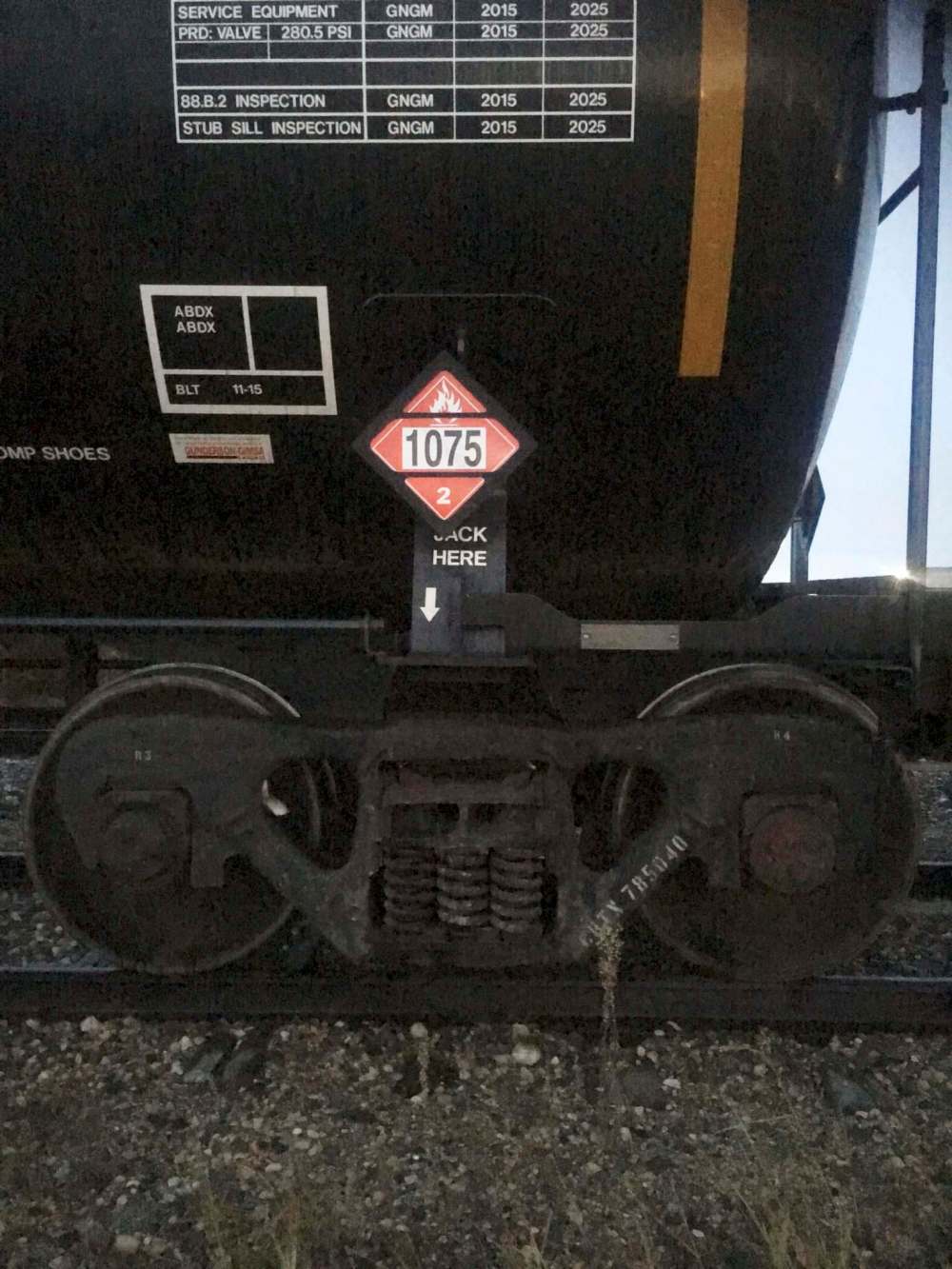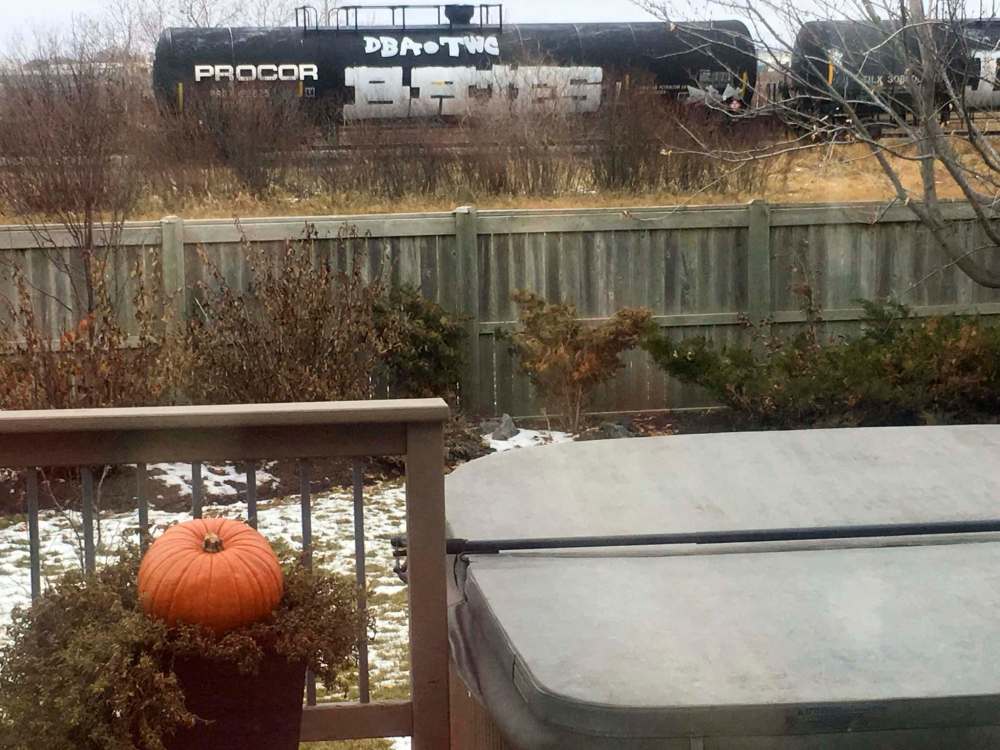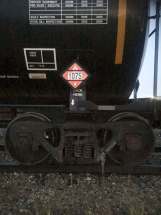Rail tankers too close for Whyte Ridge resident’s comfort but within rules
Read this article for free:
or
Already have an account? Log in here »
To continue reading, please subscribe:
Monthly Digital Subscription
$0 for the first 4 weeks*
- Enjoy unlimited reading on winnipegfreepress.com
- Read the E-Edition, our digital replica newspaper
- Access News Break, our award-winning app
- Play interactive puzzles
*No charge for 4 weeks then price increases to the regular rate of $19.00 plus GST every four weeks. Offer available to new and qualified returning subscribers only. Cancel any time.
Monthly Digital Subscription
$4.75/week*
- Enjoy unlimited reading on winnipegfreepress.com
- Read the E-Edition, our digital replica newspaper
- Access News Break, our award-winning app
- Play interactive puzzles
*Billed as $19 plus GST every four weeks. Cancel any time.
To continue reading, please subscribe:
Add Free Press access to your Brandon Sun subscription for only an additional
$1 for the first 4 weeks*
*Your next subscription payment will increase by $1.00 and you will be charged $16.99 plus GST for four weeks. After four weeks, your payment will increase to $23.99 plus GST every four weeks.
Read unlimited articles for free today:
or
Already have an account? Log in here »
Hey there, time traveller!
This article was published 26/11/2019 (2210 days ago), so information in it may no longer be current.
OTTAWA — A Whyte Ridge resident is upset after learning that rail tanker cars holding explosive fuels are allowed to sit near homes for days at a time, arguing federal rules don’t account for the uptick in dangerous-goods shipments.
“It’s really crazy they don’t even have regulations for this stuff,” said Todd Jackson, whose backyard looks out to a line of tank cars south of McGillivray Boulevard.
The cars bear a placard with the code 1075, indicating liquefied petroleum gas, which Transport Canada classifies as dangerous goods.

The track is part of Canadian Pacific’s La Rivière Subdivision, which used to primarily transport grain from elevators between Morden and Winnipeg.
Jackson has lived in the area for two decades, and has noticed grain cars have been replaced by black tankers over the course of roughly five years. They often sit for days behind his house before they’re moved, only to be replaced with more tankers before long.
“The cars aren’t very long and they don’t go very fast, which is great. You hardly notice them,” he said. “But they’re just an eyesore to look at, and of course the danger is there.”
He said he’s seen children crawling on top of the cars once or twice near Henry G. Izatt Middle School on Scurfield Boulevard. The area has a fence and signs warning people to stay away from the tracks.
Jackson reached out to Transport Canada, which had one of its Winnipeg inspectors determine whether the cars can legally be there.

The regulator told him the cars are servicing the Plains Midstream natural-gas pipeline terminal just south of the neighbourhood, and that it appeared the trains weren’t violating any regulations or laws.
The inspector told him that the cars fall under dangerous-goods regulations whether or not there is petroleum in them. The regulations involve speed limits, reporting and emergency plans, but not promixity to neighbourhoods.
Transport Canada did not dispute Jackson’s recounting.
“The cars aren’t very long and they don’t go very fast, which is great. You hardly notice them. But they’re just an eyesore to look at, and of course the danger is there.” — Todd Jackson
He said he’s grown increasingly concerned about safety, given reports about rail-worker fatigue.
A year ago, the Free Press documented CN Rail workers trying to sleep in cramped bunkers and not following directives on one of Canada’s main lines. The federal Liberals have taken CN and CP to task for lax work-rest rules.
Fatigue rules under review
OTTAWA — The federal Liberals are proceeding with a review of work rules to avoid rail-worker fatigue, but wouldn’t say if the issue was part of the agreement that ended the CN strike.
“The Teamsters, CN, CP and other unions are very, very aware of the fact that this is a priority for the government,” Transport Minister Marc Garneau told the Free Press Tuesday.
OTTAWA — The federal Liberals are proceeding with a review of work rules to avoid rail-worker fatigue, but wouldn’t say if the issue was part of the agreement that ended the CN strike.
“The Teamsters, CN, CP and other unions are very, very aware of the fact that this is a priority for the government,” Transport Minister Marc Garneau told the Free Press Tuesday.
CN Rail and the Teamsters union reached a tentative agreement Tuesday that ended an eight-day strike.
The union said fatigue was a main issue, arguing workers are scheduled without sufficient rest between shifts, and the shifts change frequently, impairing their ability to follow safety rules.
In a July letter, Garneau wrote to both major railways that he was “very disappointed” by their work-rules proposals, which “fails to treat fatigue as an issue that impacts all people equally.”
Garneau said Transport Canada is “actively working” with the unions and companies on the review.
The union published a recording Monday of a rail worker arguing with his supervisor, asking Transport Canada to verify if he was being asked to drive the train in an unfit state because of rest-period stipulations.
“Rest is not a regulatory or safety issue,” the CN supervisor said in the recording.
Garneau would not comment on the recording, but said his government has repeatedly said that dealing with rail workers’ fatigue is a priority.
— Dylan Robertson
“Whether it’s the one tanker or 20, an explosion will no doubt wipe you out if you’re right behind it. So that’s not a good feeling,” he said, adding property values will likely take a hit, and he’s reached out to both his city councillor and member of Parliament.
Winnipeg’s city council has adopted rail-proximity guidelines created by the Canadian Federation of Municipalities and the Railway Association of Canada, though the apply only to new developments.
The guidelines state that railways’ main lines should be at least 30 metres away from homes, and railyards should have a buffer ten times as large. In Whyte Ridge, the track sits 61 metres from the local school and homes, meaning it’s within the rules for new builds.
To Jackson, the larger setback for railyards suggests that tank cars holding dangerous goods shouldn’t be shouldn’t be sitting on a rail line for days at a time.
“It’s sort of a mini freight yard,” he said. “It just doesn’t seem right.”
CP Rail did not respond to a request for comment, and Plains Midstream declined to comment.
dylan.robertson@freepress.mb.ca
History
Updated on Tuesday, November 26, 2019 6:37 PM CST: Updates headline









